On a Mission
Helping the Philippines’ Less Fortunate
Alfredo Evangelista | Assistant Editor
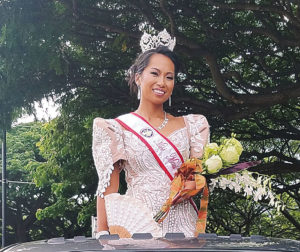
On May 17, 2019, Miss Maui Filipina Vanessa Joy Baldos will embark on a journey to the Philippines.
This will not be her first trip there as she used to travel with her parents every two years when she was younger—and she visited the Philippines last year with her boyfriend’s family. But this year, she has a crown and a title.
So what makes this trip different from other beauty queens?

Two months before her trip, Vanessa decided she would use the power of social media to fund raise and build awareness of her school visitations. “Here at home, there’s a lot of budget cuts affecting education and I knew it would be worse in the Philippines so I wanted to do something positive with my trip, publicize it, and reach out to others who felt the same way as me. Although I’m there as Miss Maui Filipina, my main focus is on visiting schools and distributing school supplies.” Vanessa will visit Saoang Elementary School in San Juan, Ilocos Sur where her mom Juvy Viloria attended; V. Gallardo Elementary School in Castellejos, Zambales where her father Danilo attended; and Amarosa Elementary Schhol in Santa Rosa, Laoag City where her boyfriend’s mom attended.

“I’m a little shy in asking people directly so I decided to go on social media to get support,” explains Vanessa. So she created a poster on Facebook and even convinced Wailuku Seafood to accept donated school supplies.
“I was surprised at the amount of support I received right off the bat. I received donations the moment I posted, including friends I haven’t seen since high school or former co-workers from eight years ago. It was surprising and a great way to reconnect with them.”
Vanessa has already exceeded her goal of $800.00 and raised $1,136.00 but she knows that every additional dollar will help. (Contact her at (808) 727-0913.)
Vanessa has also collected a box of school supplies such as paper, pencils and pens, and other classroom essentials. She plans to buy the school supplies in the Philippines to avoid the additional expense of shipping.
“It will also help the Philippine economy by buying the supplies there,” she explains. The continued sad state of the Philippines’ economy has severe consequences, including the lack of drinking water.
In 2016, Rick Nava and his wife Rina traveled to Tacloban to dedicate a sanitation and wash station for A.P. Banez Memorial Elementary School.
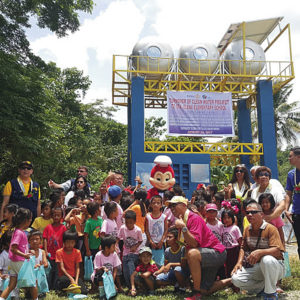
“The school had over 900 students and only one outhouse and we saw the children fetching water from a polluted river,” explains Rick. With the assistance of Dana Pastula and Café O’Lei, they were able to finish the first water project in March 2017.
To date, they’ve constructed four clean water systems in Tacloban City and Davao City.
“We’ve used our Rotary International Network to help open doors,” explains Rick. We’re partnering with the Rotary Club of Paco Manila to provide clean water for the Batak Tribe of Palawan as well as deliver clothes, school supplies, toys and footwear for the street children of Manila.”
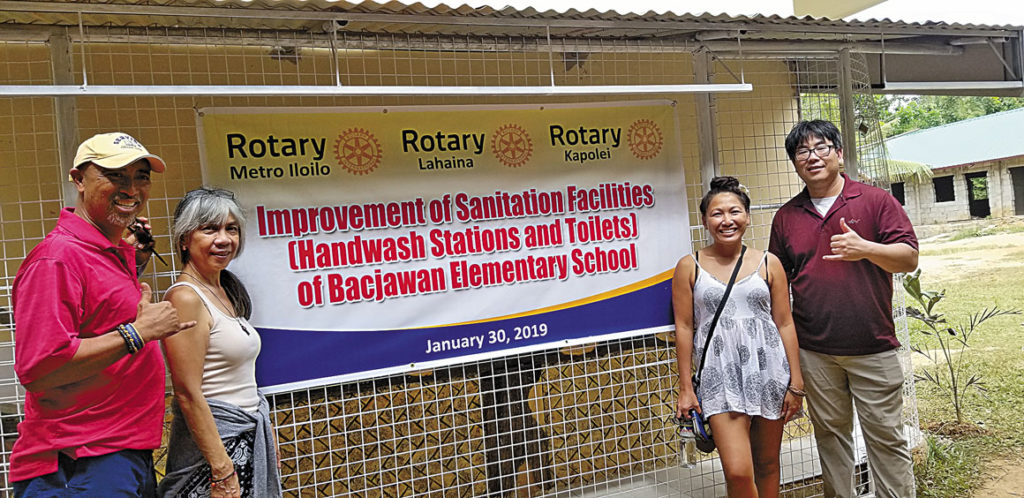
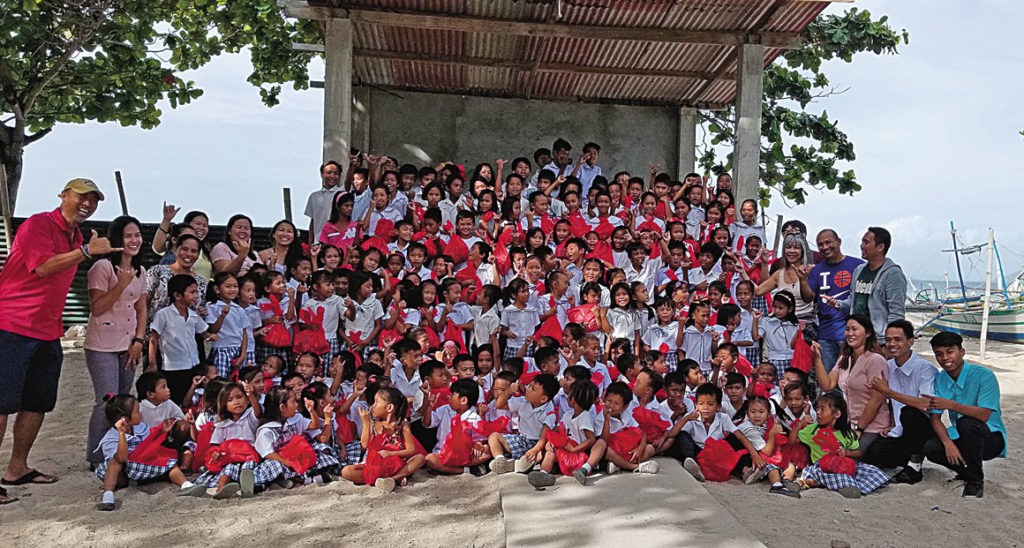
In addition to basic necessities, there is also a spiritual need. The Two-Thirds World Network Mission—a Christian based ministry founded in November 2010—travels to the Philippines twice a year to share the Gospel and Good News and to provide medical and dental assistance.
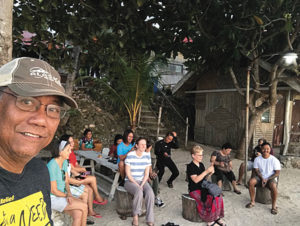
“Our vision is a dynamic engagement of human and spiritual resources helping Christian leaders to build influential leaders whom God will use to shape a new future for Christians living in the Two-Thirds World,” explained Vince Bagoyo, Jr., who recently returned from a twelve day mission to North Luzon and Cebu.
The mission consisted of three churches from Maui: Valley Isle Fellowship, Hope Chapel Kihei, and New Hope Iao Theatre plus two teams in the Philippines from the International Baptist Church of Manila. The mission spent four days in Santa and Narvacan in Ilocos Sur where they did church plants. The mission also traveled to Medellin and Camotes Island in Cebu where they did three church plants.
“A church plant means we provide financial support for the pastor for their salary, housing allowance, transportation allowance and medical so they can concentrate on direct ministry instead of having to work someplace else,” explained Vince.
“It takes around $10,000 to initiate a new church in the Philippines and the same amount to sustain it annually and they all become self-sufficient in three years.”
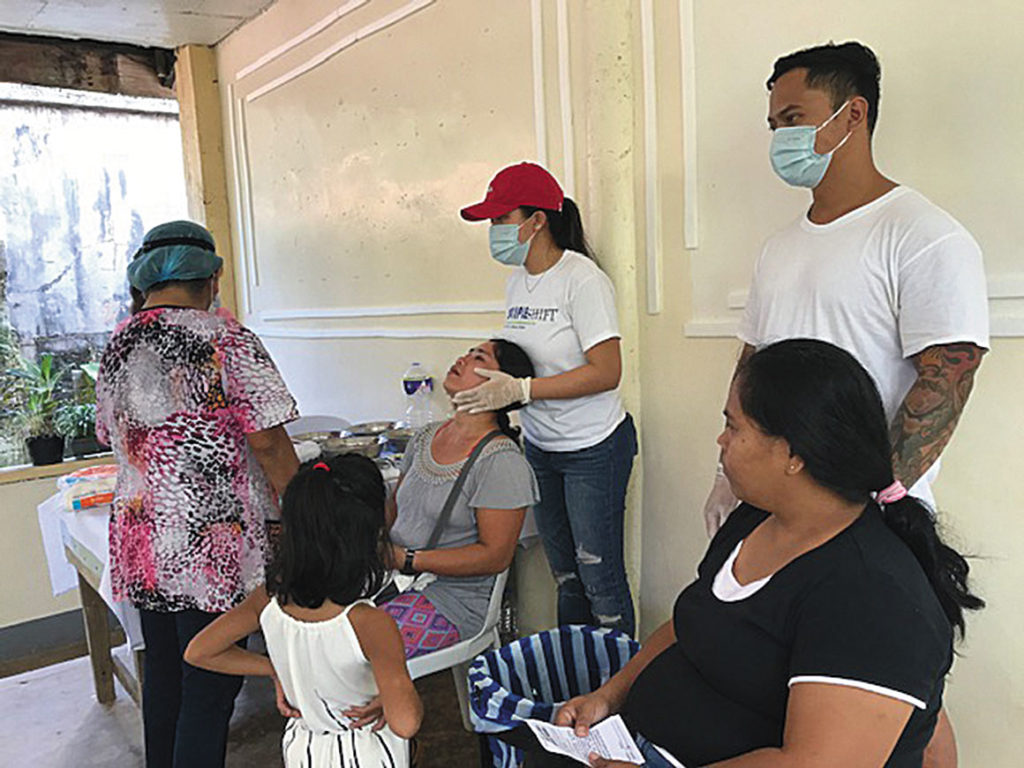
Medical assistance was also provided, including providing medicines through a mobile pharmacy. But ministry is a required component. Before they can even see the doctor, the patients spent fifteen minute sessions with the missionaries. “To let them know that God is doing this, not us,” explains Vince.
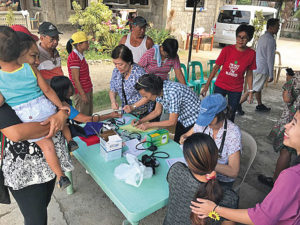
The mission also visited Imelda Marcos High School in Narvacan and Basug National High School in Santa. At the schools, the team leaders shared their faith, prayed with them, and responded to questions. “At Santa, I was asked the question ‘What made you leave Santa village,’” Vince said. “Rather than highlighting my personal experience, I always tried to highlight and focus on Christ, which is our mission.”
In March, Staff Sergeant Jim Evangelista of the Army National Guard served two missions in the Philippines. Jimbo, as he prefers to be called, is one of three full-time Army National guardsman in the County of Maui. He is part of the 103rd Troop Command, 230th Engineer Company that is based in Maui and Jimbo is the Logistic NCOIC (Non commission officer in charge). From March 6 to March 22, Jimbo was part of the Encap (Engineering Civil Action Program) mission, with fourteen guardsmen from Maui, 1 from Lana‘i, 2 from O‘ahu and twenty U.S. Seabees and eleven from the Armed Forces of the Philippines.
“As the logistics officer, I was the first one on the ground to set up everything in Tacloban, Leyte,” Jimbo explains. “We built a brand new school in Tacloban, Santa Elena. Two classrooms are also used as an evacuation center so it’s a multi-purpose center. Normally it takes thirty days but the guard is only allowed fifteen days in-country for training. So we did part of the school and then shifted to the VNG Health Clinic in Tacloban.”
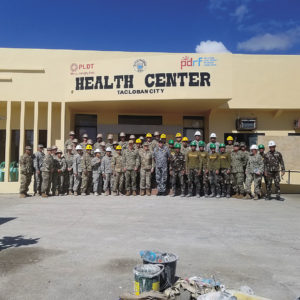
The effects of the 2013 Super Typhoon Haiyan are still being felt. “The VNG Health Clinic was built right before Haiyan but it was damaged during the Super Typhoon,” explains Jimbo.
“We did a complete renovation including changing the roof, changing all ceilings, changing toilets and other plumbing, reinstalling doors, reinstalling tile flooring, reinstalling the sink, reinstalling the rails for the outside walk paths, scraping all the old paint, and repainting the whole building. We started on March 10 and completed it and had it dedicated on March 22.”
Three days later, Jimbo shifted his mission to the CDRE (Community Disaster Resilient Exchange) run by SPP (State Partnership Program) which the Hawai‘i National Guard partners with the Republic of the Philippines. Maui was represented by Herman Andaya, the administrator for the Maui Emergency Management Agency, Jeremy Story of the Maui Fire Department, Staff Sergeant Roell Galo, and Jimbo while O‘ahu sent seventeen participants.
The CPX (Command Post Exercise) lasted for three days in Quezon City, which is a sister city to Maui.
“The intent of CDRE is to determine how the City will react when a calamity hits,” explained Jimbo. “What will the City do when the barangays are overwhelmed? How will the City communicate to assist the barangays?” The CDRE was of special interest to Jimbo because he’s in charge of the Maui Guard’s Search and Rescue team. Although these four Missions have different focuses, the intent is to help the Philippines’ less fortunate.
“I’m doing this because I want to inspire children and help them be set for school,” Vanessa explains. “A lot of the success I have now is due to my experiences in school.”
Vanessa notes that nearly one million out of 3.6 children do not attend school in the Philippines due to financial reasons. “My advice to kids is that ‘Your situation does not define you.’ As the Miss Maui Filipina, I want to do more than appearances. I want to give and I want to help.”
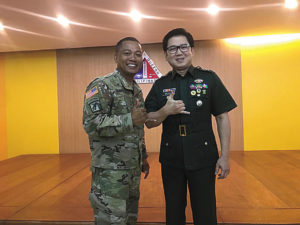
Jimbo has been doing these mission trips since 2012, initially through his Balikatan missions that have now stopped because the focus is on the Pacific Partnership. “We built schools in Cebu, Bicol, Iloilo and Tacloban,” Jimbo says.
“We also did search and rescue exercises in Subic Bay, Camp Aguinaldo, Cebu, Tanay, Rizal, and Cagayan.” Rick who was in Manila, Iloilo City, Davao City, Pampanga and Pangasinan this past January, is already gearing up for the next trip in January 2020 which will include Palawan. “We’re trying to make a difference and change the lives of people who really need help,” he said.
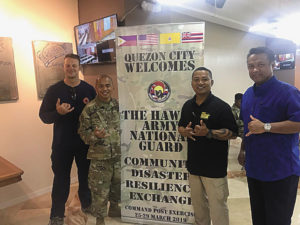
“It’s really impossible to explain in words just how significant and life changing my experience on every mission that I participated in was unless you were there,” said Vince. “To tell a story about our recent mission to the Philippines is to tell a story of every member on a mission trip. A story that is so intertwined that only God can create something so beautiful.”
Alfredo G. Evangelista was born in Wailuku, Maui. He first visited the Philippines in 1972 with his parents and two siblings. He returned in 1992, 1993, 1994, and 1999 as part of the Filipino Chamber of Commerce of Hawai‘i’s Trade Missions. His last visit was in 2001 when he accompanied his mother Catalina to Paoay in Ilocos Norte to say prayers for his Dad Elias on the occasion of his one year death anniversary.
